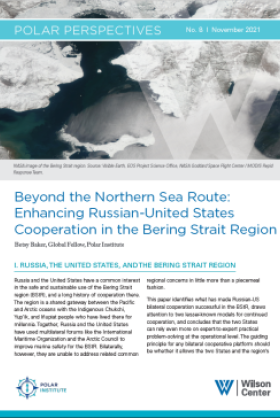Polar Perspectives No. 8 | Beyond the Northern Sea Route: Enhancing Russian-United States Cooperation in the Bering Strait Region


Russia and the United States have a common interest in the safe and sustainable use of the Bering Strait region, as well as a long history of cooperation there. As the only passage between the Pacific and Arctic Oceans, the Bering Strait is a mere 47 nautical miles wide (87 km/54 US miles) and, at its narrowest point, separates the Russian Federation and the United States by about two nautical miles (3.7 km/2.3 US miles). As vessel traffic increases in the Arctic, the Bering Strait requires vastly improved and updated charting as well as expanded search and rescue support to ensure maritime safety. Together, Russia and the United States have used multilateral forums like the International Maritime Organization and the Arctic Council to improve marine safety for the Bering Strait. Bilaterally, however, they are unable to address related common regional concerns in little more than a piecemeal fashion.
In Polar Perspectives No. 8, Dr. Betsy Baker identifies what has made Russian-U.S. bilateral cooperation successful in the Bering Strait Region, draws attention to two lesser-known models for continued cooperation, and concludes that the two States can rely even more on expert-to-expert practical problem-solving at the operational level. Ultimately, successful cross-strait cooperation in the region depends upon shared objectives, continuously open communication channels, and trusted institutional foundations supported by the two coastal States and its Indigenous peoples, whose linguistic and cultural ties have spanned the region for millennia.
Author


Polar Institute
Since its inception in 2017, the Polar Institute has become a premier forum for discussion and policy analysis of Arctic and Antarctic issues, and is known in Washington, DC and elsewhere as the Arctic Public Square. The Institute holistically studies the central policy issues facing these regions—with an emphasis on Arctic governance, climate change, economic development, scientific research, security, and Indigenous communities—and communicates trusted analysis to policymakers and other stakeholders. Read more






